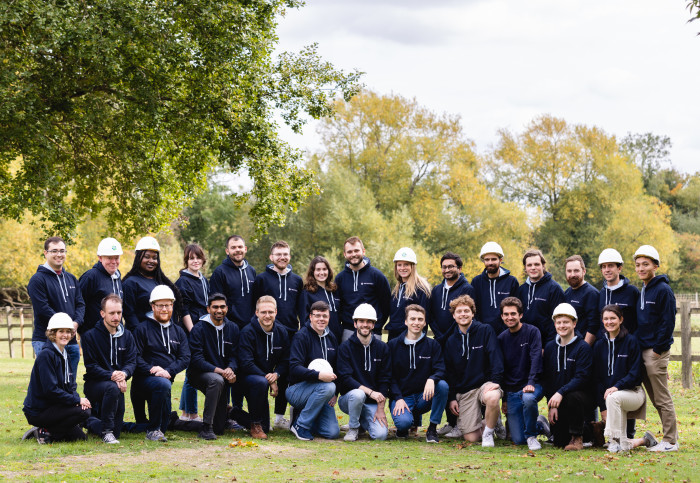Recycleye raises new investment and the next generation of innovators
by Ian Mundell

The Recycleye team
A company created by Imperial alumni is helping nurture innovation and entrepreneurship among the Master’s students of today.
Recycleye, a high-tech waste sorting company started by two Imperial alumni in 2019, has raised an additional $17 million (£14m) in investment to support further development of its business. Meanwhile, the company maintains close links with Imperial, helping to develop the next generation of entrepreneurial students.

Victor Dewulf and Peter Hedley came up with the idea behind Recycleye when they were Master’s students at Imperial, studying environmental engineering with business management and computer science respectively.
They combined computer vision, machine learning and robotics to produce a system capable of sorting municipal waste more accurately and more consistently than is possible with human waste pickers.
First of all, a camera collects digital images of mixed waste as it passes on a conveyor belt. These images are fed into a machine learning algorithm, which identifies individual items in the waste stream and ranks them in terms of picking priority. This data is then sent to a robotic arm that picks up and separates out the desired items for recycling, or removes contaminants to clean up the waste stream.

The data collected and processed by the system also provides the waste plant operators with valuable information about the composition of the refuse they are handling.
Staying connected
The co-founders developed the system in a garage at one of their parents’ homes, using a camera, a treadmill and a pile of rubbish. After founding their company in 2019, they participated in the 2020 Venture Catalyst Challenge, an entrepreneurial competition for Imperial students and alumni, taking home a share of the Social Impact prize.
While working to establish Recycleye, Mr Dewulf maintained his connection with the Department of Civil and Environmental Engineering at Imperial, developing projects for Master’s students on his old course. One of these students was Paloma Aldeguer, who was hired after graduation as one of the company’s technical sales managers.

“Once I joined Recycleye, I took over that relationship with the department, and I've been working for the past two years with the academic directors to help make these research projects a cocktail of academic approach and industrial application,” she says.
The projects she proposes draw on Recycleye’s strategic objectives in terms of developing the circular economy and pushing forwards its technology. They might involve thinking about a modular approach to process engineering a municipal waste plant, or how Recycleye’s system might interact with the informal recycling sector in a developing country.
Ms Aldeguer works with the students as their projects progress, generally over a period of three months. “We provide industry knowledge, technical resources and understanding, site visits, and introductions to industry stakeholders, as required,” she says. And the flow of knowledge goes both ways. “It’s an advantage for us to stay close to academia, to know what developments are under way, to hear what students think, and to spot any talented people that might be a good fit for the company.”
The mutual benefit is also clear to Professor Sue Grimes, MSc Course Director of the Environmental Engineering programmes, and academic supervisor of the projects involving Recycleye.
Such relationships with our alumni offer inspiration to those engaged in our vocational MSc programmes, seeking to define their career paths. Professor Sue Grimes Department of Civil and Environmental Engineering
“I’ve observed first-hand the rewarding experience derived from the relationship for our Master’s students, and the benefits to the company through this on-going collaboration,” she says. “Such relationships with our alumni are greatly valued, and offer inspiration to those who are engaged in our vocational MSc programmes, seeking to define their career paths.”
A similar relationship exists with the Department of Computing, with projects proposed for Master’s students interested in machine learning. “These projects are more technically driven, and we generally ask the students to design of a piece of code that we will then implement within the company,” says Ms Aldeguer. The liaison for these projects is Benedetta Delfino, Recycleye’s tech lead for machine learning, and another Imperial Master’s graduate, while the academic supervisor at Imperial is Professor William Knottenbelt.
New investment
With £14 million in new funding to work with, Recycleye has plans to develop both its technology and its business. “This new investment will help us to further fine-tune our world-leading solutions, underpinned by the solid maintenance network our clients need to generate more output value,” said Peter Hedley, who is now the company’s chief technology officer.
The waste companies Recycleye works with are facing the double challenge of labour shortages and increased costs, while responding to growing demand for high-quality materials for recycling. Its systems are currently installed in facilities in England, Ireland, Scotland, Germany, Australia, the US and France, with multiple robot orders confirmed in Italy and Belgium.

“The opportunity for applying AI waste sorting technology to the global waste management sector is staggering, even when only 8% of waste is currently recycled,” added Vincent Dewulf, now Recycleye’s chief executive. “With this investment, we can scale our operations to target a market which we estimate to be worth $114 billion globally today, but with the potential to increase by to $1.6 trillion when the cost of sorting is reduced.”
Recycleye’s Series A funding round was led by American deep-tech venture capital firm DCVC, making its first investment in the company. Many previous investors increased their stakes in this latest round, with Madrid-based Seaya Andromeda joining for the first time.
Article text (excluding photos or graphics) © Imperial College London.
Photos and graphics subject to third party copyright used with permission or © Imperial College London.
Reporter
Ian Mundell
Enterprise